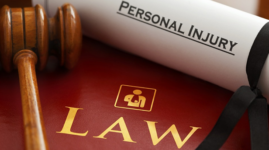Injuries can really put a damper on our lives. We’re just walking along and carrying on with our days and then, one day, the bottom falls out from underneath us. In some cases, the bottom might literally fall out from underneath us if we’re walking on a shoddy or poorly-maintained walkway or structure. In those cases, the person responsible for that walkway or structure might be held legally liable in a court of law, but there are few guarantees in the court system. There’s a chance you can go through a long, exhausting process and end up in exactly the same place as you were before, or maybe a little worse. Any decent lawyer will tell you that, but before you talk to a lawyer, there are some things that might be worth considering.
Type of injury
Common sense is helpful when determining whether or not you may have a case. It’s not the only factor, obviously, but it’s a decent starting point. If you slipped on a freshly-mopped floor but only ended up with a bruise to your ankle, it’s probably not going to be worth the time or energy it would take to consult with a lawyer, file a suit, and then wait for the suit to play out in court. You also don’t want to be seen as greedy or looking for a payday. Make no mistake: some people view everyone who files a personal injury suit as greedy, and that’s in no way fair, but people who file cases that might be seen as frivolous often get more scrutiny. Perhaps most importantly, you shouldn’t go to court unless you’re looking to recover more significant damages. The cost of a bandage and ice pack for your ankle is not going to be seen as significant.
A serious and life-altering injury is a bit like a flat tire: You’ll know when it’s happening, and there will be no need to guess. It may not be apparent at first, but something that drastically affects your quality of life is a lot more likely to result in a favorable settlement. Let’s say a doctor performs a surgery and makes several errors that leave you with a lifelong disability. That could very well be a violation of what’s known as the doctor’s “duty of care.”
Time limits
In most cases, you can’t file a personal injury suit that’s related to an incident that occurred a decade ago. Statutes of limitation are there to keep the court system running in as smooth and efficient a manner as possible. Those time limits vary depending on location. Remember to focus on the place where the incident occurred, not your current or past address. If you live in Vancouver but had the accident in Surrey, you’ll need to search for Personal injury lawyer Surrey instead of “Personal injury lawyer Vancouver.” In that example, you’d typically have two years from the date the injury occurred to file a case. Many lawyers offer free initial consultations, which means you shouldn’t have to worry about legal costs until you determine whether or not you have a viable case.








